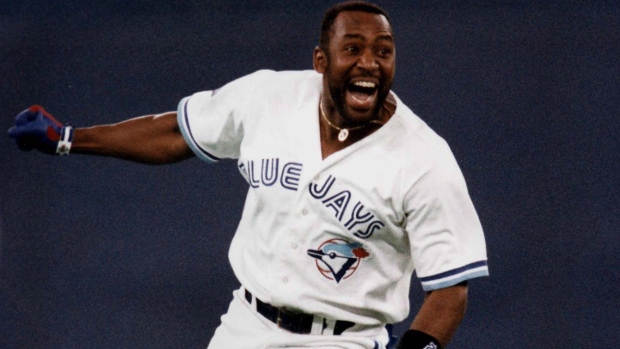Aug 24, 2015
Where are they now: 92-93 Blue Jays
The Toronto Blue Jays are in first in the American League East and looking like a serious post-season contender for the first time since they won the 1993 World Series. Here's a look at five members of the 1992 and 1993 World Series champion Blue Jays and where they are now.
The Canadian Press

TORONTO - The Toronto Blue Jays are in first in the American League East and looking like a serious post-season contender for the first time since they won the 1993 World Series. Here's a look at five members of the 1992 and 1993 World Series champion Blue Jays and where they are now.
PAT HENTGEN
The right-handed pitcher was drafted by Toronto in 1986 and debuted with the Blue Jays in 1991. He came out of the bullpen throughout the 1992 season with a total of 50.1 innings pitched. Hentgen's impact was really felt in 1993 when he led Toronto with a 19-9 record in the regular season with 122 strikeouts and 3.87 earned-run average.
He won Game 3 of the 1993 World Series against the Philadelphia Phillies, giving up one earned run over six innings of work as Toronto rolled to a 10-3 victory.
Hentgen continued to improve on the mound, winning the American League's Cy Young in 1996. He retired in 2004.
Today, Hentgen is still involved with the Blue Jays, working in the team's front office as Special Assistant to the Organization.
JOHN OLERUD
Olerud became Toronto's full-time first baseman at the start of the 1992 season and immediately made an impact. His sharp defensive play — with trademark batting helmet always on in the field — coupled with his strong hitting made him an important piece of both World Series teams.
He led the American League in batting average (.363), intentional walks (33), times on base (321), on-base percentage (.473) and doubles (54, also a career high) in 1993. That season he made career highs in home runs (24), RBIs (107), runs (109), and hits (200). An exciting subplot to Toronto's season that year was his quest to become the first player since Ted Williams in 1941 to hit .400 in a season. His average staying higher than .400 as late as Aug. 24.
Olerud played for the New York Mets, Seattle Mariners, New York Yankees and Boston Red Sox before retiring in December 2005.
He nows lives in Washington with his wife and children. The NCAA's John Olerud Award is given to the best two-way player in American collegiate baseball after his All-American play for Washington State University as a pitcher and first baseman. He was inducted into the National College Baseball Hall of Fame in 2007.
DUANE WARD
Tom "the Terminator" Henke was Toronto's dependable closer in 1992, with Ward serving as an increasingly reliable setup man. But in 1993 Henke had moved on to the Texas Rangers, allowing Ward to take over the coveted closer's role.
Ward earned 45 saves with 97 strikeouts in the regular season, with saves in Game 1 and Game 4 against the Philadelphia Phillies. He was also the pitcher of record when Joe Carter hit his walkoff three-run homer in Game 6 of the 1993 World Series, handing the Blue Jays closer the win. Amazingly, it was Ward's last appearance as a closer in the majors. He missed the entire 1994 season with bicep tendinitis and retired after pitching four games for the Blue Jays in 1995.
Baseball fans in the Toronto area know exactly where Ward is today. He is regularly featured on local Blue Jays radio broadcasts, filling in for colour commentator Joe Siddall.
KELLY GRUBER
Blonde-haired third baseman Gruber was selected by the Blue Jays in the 1983 Rule 5 Draft, taking him from the Cleveland Indians organization. He was the first player in Blue Jays history to hit for the cycle, earning four hits in six at bats on April 16, 1989.
However, Gruber's best known for his role in a non-call in Game 3 of the 1992 World Series. Gruber made a diving tag on Braves baserunner Deion Sanders' foot between second and third base to record the final out of a triple play. It would have been only the second such play in World Series history. However, the second-base umpire ruled Sanders safe.
Gruber tore his rotator cuff on the play but he still hit a key game-tying home run in the eighth inning, and the Jays would go on to win the game and the Series.
He was traded to the California Angels in 1993 but had to retire after 63 games due to a bone spur on his spine that threatened paralysis. Gruber attempted a comeback with the Baltimore Orioles in 1997 but decided to retire for good to preserve his health.
Today Gruber holds baseball seminars and does public appearances as a motivational speaker for charitable organizations.
JOE CARTER
The trade that brought Carter and Roberto Alomar from the San Diego Padres to Toronto in 1990 was the crucial move that created the Blue Jays dynasty of the early 1990s. Carter was a clubhouse leader in Toronto and made the final out of the 1992 World Series.
However, he is best remembered for his walkoff three-run home run in the bottom of the ninth inning of Game 6 in the 1993 World Series. Carter's exuberant jumping around the bases is the most memorable moment in Blue Jays history.
He stayed in Toronto until 1997 and briefly played with the Baltimore Orioles and San Francisco Giants before retiring in 1998.
Carter had a brief career as a TV broadcaster for the Blue Jays and Chicago Cubs before focusing on doing charitable works for the Children's Aid Foundation. He was also featured on the cover of Drake's song "Back to Back," a track devoted to insulting Philadelphia-based rapper Meek Mill.

